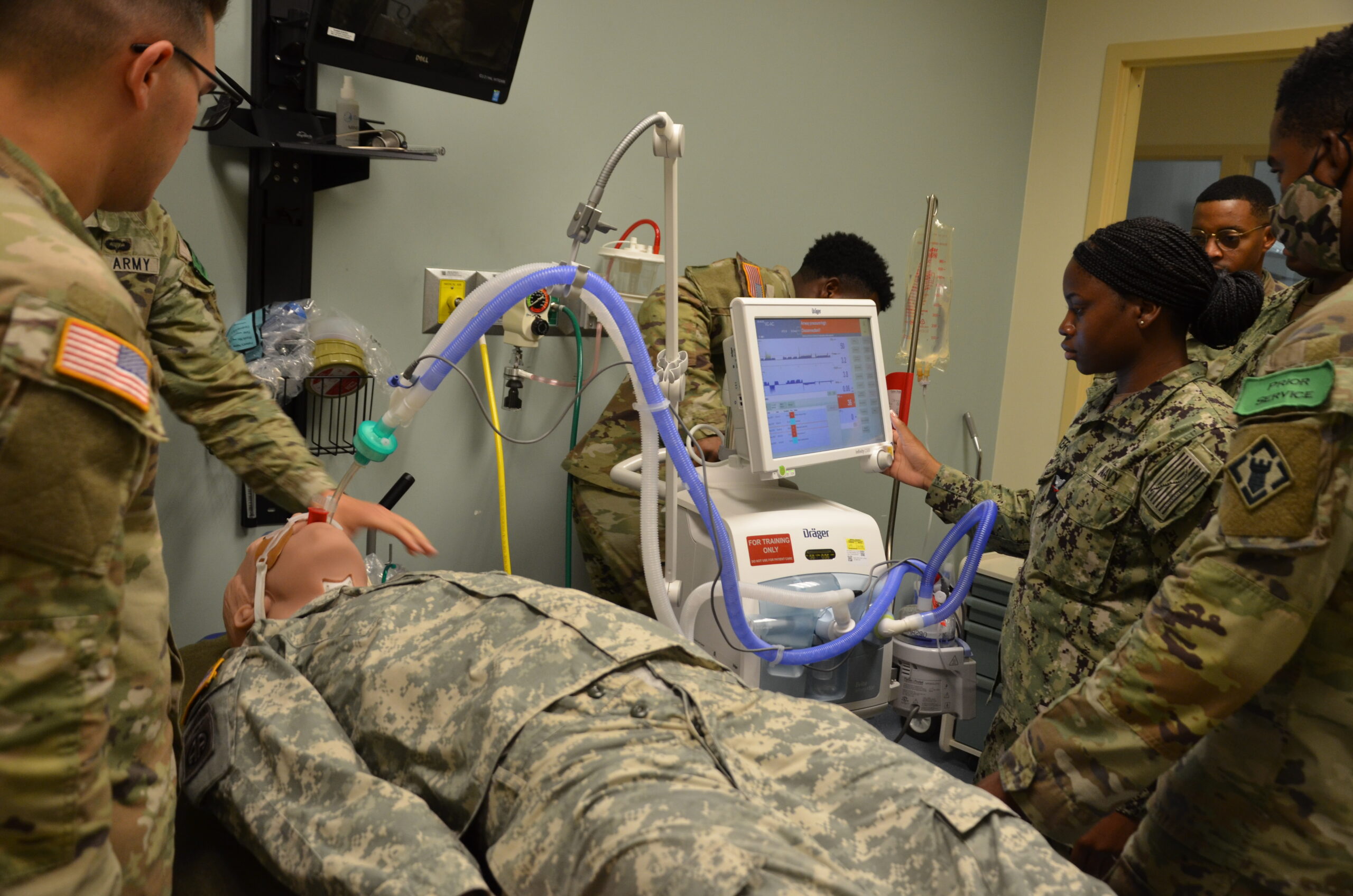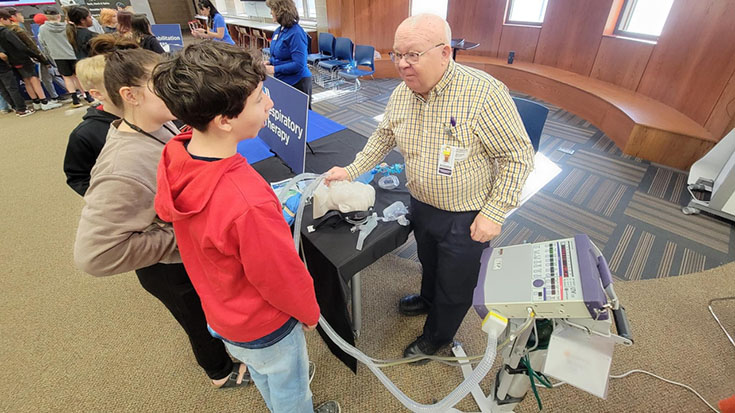
Are you a recent grad? Are you now needing to take the NBRC exam? We’ve got you covered!
Sign Up for the Exam Prep Course
We recently asked AARC member, William (Bill) F. Galvin, MSEd, RRT, CPFT, AE-C, FAARC, to give us his exam prep tips and strategies. Galvin is an Assistant Professor and the Program Director for the Respiratory Care Program at Gwynedd Mercy University, here is what he had to say—
A word of advice
Securing that perfect dream job – high paying, meaningful and fulfilling – is the ultimate goal of all aspiring respiratory therapy graduates. However, getting to this point involves one last and crucial hurdle. That is, successfully passing the NBRC credentialing examination.
You see, you put in your time (2-4 years of schooling), did the hard studying, actively participated in all your clinicals, and attended a good program with highly qualified and caring educators that set the bar high and placed high standards on you. You actively engaged in a rigorous curriculum inclusive of A&P, chem, micro, and all those demanding RT courses. You did all the prep work and did it well. So, what’s the worry? What’s the concern? What’s standing in the way of achieving the RRT credential?
Well, nothing! All the preliminary and tough work is behind you and you simply need to register for the exam. Depending on your time frame, you need to develop a game plan to prepare for the exam. If you are six to eight weeks out, there is still time for an intensive review. If you are in two to four weeks from the exam, pulling out your text is not the thing to do. And finally, if you are within a week to only days of the big day, then last minute testing details and getting your “mind in the game” is where you want to be.
Here are tips and strategies to consider.
6-8 Weeks Out
Remember the heavy lifting is behind you. You have two to four years of a demanding and challenging curriculum completed. T the strategy should be to revisit the important stuff. Attend a review course or purchase a review book and develop a schedule. If you chose the latter, we’re talking about three to four hours per week of dedicated, focused and uninterrupted study time where you go to a quiet location and immerse yourself in study. No interruptions and no breaks to answer calls, texts, or emails but complete submersion in studying respiratory therapy.
If you are considering attending a review course, get it as close as possible to the exam date but no closer than a week as you may need a little time to work on any areas that you identify as needing remediation. And there may likely be a few areas, but probably only a few.
2-4 Weeks Out
Reading your textbook or any kind of deep dive, won’t work when you are close to your exam day. Instead, take time to focus on problem areas.
Taking a self-assessment exam that test specific content areas is probably the best strategy to identify your areas of need. Consider any resource where you can determine areas to target or focus your energy. These must be relatively small areas and doing so in the form of answering questions is perhaps optimal. A source that provides a bank of questions and detailed explanations and answers is best as you do not want to use valuable time looking up stuff. Generally speaking, the areas of physical assessment and mechanical ventilation will likely provide the most return for investment of your time and energy. It is too late for a comprehensive content review. This should be focused study.
The One-Week Countdown
Forget the textbooks and assessment of problem areas. It’s time to get your head into the game and consider last minute test taking strategies and techniques. Break this time into areas: (1) preparatory measures for the day(s) leading up to exam day and (2) actual exam day activities.
Let me explain by working backward.
Schedule your exam at your peak performance time. Some of us are morning people and some stay up late, so schedule accordingly. Start by thinking what you would do the night before and day of the exam.
The night before should be a time of little stress – watch a movie, have light dinner and avoid alcohol, take part in casual conversation with friends or family but certainly no heavy lifting. It should be affirmations of a job well done in your program and positive thoughts that you prepared and are ready for battle.
Leading up to this night before and day of, should entail a walk-through of what you will do the day of the exam. When you will leave? How you will get to the exam site? Where you will park? What you will bring?
We know that the NBRC does allow remote testing and if you are comfortable with this, then go for it. Be certain to adhere to all testing requirements. My personal preference would be a test center so as not to worry or concern yourself with technical issues. Choose according to your preference and comfort.
In short, recognize that preparation will entail everything leading up to the exam to a visualization of sitting in front of the computer screen and starting the exam. Do I have your heart beating? Ha! Well, if so, that’s a good thing, as this will ease the actual discomfort when the real time occurs.
Exam Day
Set your alarm and have a friend call you at your designated time. If you have someone else calling you (as well as your alarm clock and cell phone, ha!), there will be little reason to worry so be sure to do this. Do allow plenty of time for daily rituals and for travel to the site.
If you like to jog in the morning, have that second cup of coffee, etc., stick to your schedule.
Prepare your travel and have a back-up plan, someone to call if the car won’t start. Better yet, have someone drive you and not someone that will quiz you on the way down but rather a calming person that will help you with your nerves and anxiety.
Know where the test center is located and make a trip there in advance to determine traffic and parking arrangements. Be sure to bring a small bag with “things” you will need – proper ID, gum, ear plugs, etc.). Have them ready in advance.
Test Taking Strategies and Techniques
Read the question. Do so in its entirety. Every word in the stem statement has significance so look for them carefully. Words like “chronic, acute, immediate, first, always,” are critical in answering the question. They can make the difference between choice “B” or “C” so don’t overlook them.
Use the Process of Elimination. This is a tried and true technique that will reap huge rewards. It’s a numbers game and whenever you can eliminate an option, you significantly increase your likelihood for a successful response. Reducing your choices down to two versus four is immensely helpful. Be sure to practice it.
Watch your Time. You have just over a minute for each multiple-choice item and over 10-12 minutes per sim. This should be plenty of time, but never leave an item unanswered. This is an extremely important point and unforgiveable. So be certain to put something down for each item. Using the same letter for a string of unanswered items is probably best. But remember … answer every item and leave nothing on the table.
Positive Self Talk Up. You went through a very good program. Had great teachers. Studied and prepared. I always say: If you put out at practice, meaning you worked your butt off during school and clinical, you will win the game on Sunday. It’s time to believe in yourself. Positive self-talk is just that, it’s affirming that you did the work and will get the reward. So have good thoughts!
My best to you on the NBRC Examination.
Email newsroom@aarc.org with questions or comments, we’d love to hear from you.














